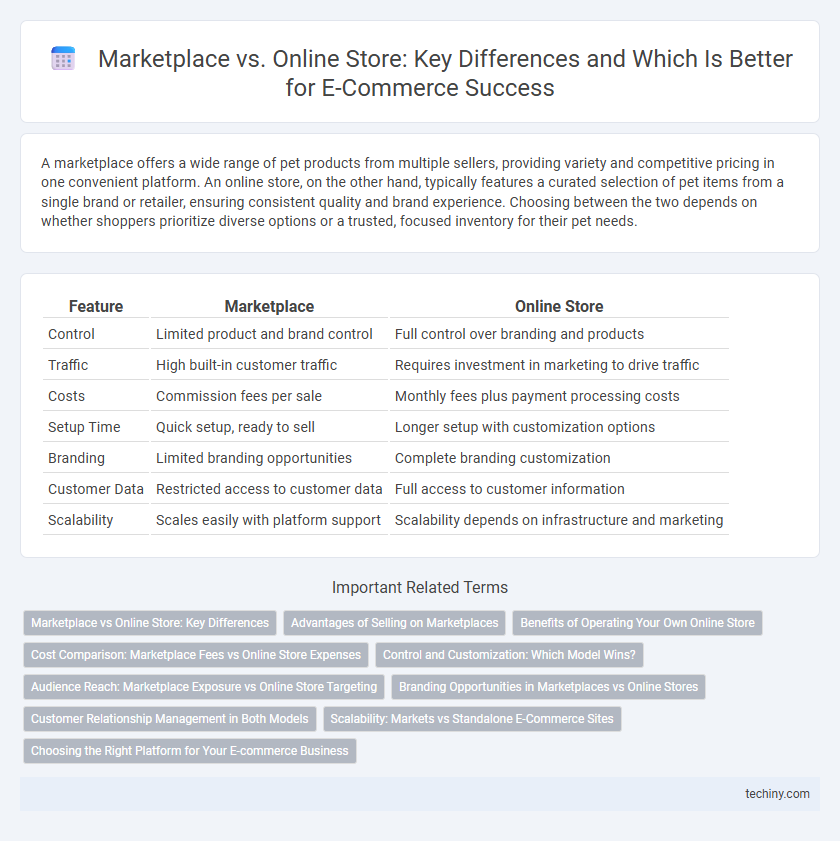A marketplace offers a wide range of pet products from multiple sellers, providing variety and competitive pricing in one convenient platform. An online store, on the other hand, typically features a curated selection of pet items from a single brand or retailer, ensuring consistent quality and brand experience. Choosing between the two depends on whether shoppers prioritize diverse options or a trusted, focused inventory for their pet needs.
Table of Comparison
| Feature | Marketplace | Online Store |
|---|---|---|
| Control | Limited product and brand control | Full control over branding and products |
| Traffic | High built-in customer traffic | Requires investment in marketing to drive traffic |
| Costs | Commission fees per sale | Monthly fees plus payment processing costs |
| Setup Time | Quick setup, ready to sell | Longer setup with customization options |
| Branding | Limited branding opportunities | Complete branding customization |
| Customer Data | Restricted access to customer data | Full access to customer information |
| Scalability | Scales easily with platform support | Scalability depends on infrastructure and marketing |
Marketplace vs Online Store: Key Differences
Marketplaces aggregate multiple sellers on one platform, offering a wide product variety, while online stores operate as individual branded shops with curated inventory. Marketplaces handle payment processing, customer service, and logistics, whereas online stores maintain full control over pricing, branding, and customer relationships. Sellers on marketplaces benefit from built-in traffic, but struggle with competition and lower margins compared to the direct control and higher profit potential in online stores.
Advantages of Selling on Marketplaces
Selling on marketplaces offers access to a vast, established customer base, increasing product visibility and potential sales without the need for extensive marketing efforts. Marketplaces handle payment processing, customer service, and logistics support, reducing operational complexity for sellers. Enhanced trust signals from established platforms boost buyer confidence, making it easier to attract repeat customers and build brand reputation.
Benefits of Operating Your Own Online Store
Operating your own online store provides full control over branding, customer experience, and pricing strategies, enabling a unique market positioning distinct from generic marketplaces. Direct access to customer data allows for personalized marketing and enhanced customer relationship management, boosting loyalty and repeat sales. Additionally, owning an online store eliminates marketplace fees, increasing profit margins and providing greater flexibility in promotional campaigns.
Cost Comparison: Marketplace Fees vs Online Store Expenses
Marketplace fees typically include commissions ranging from 5% to 20% per sale, listing fees, and promotional costs, impacting overall profit margins. In contrast, online stores incur expenses such as website development, hosting, payment processing fees, and marketing budgets, which can be more predictable but require upfront investment. Understanding the cost structure differences helps sellers optimize profitability by balancing transaction fees versus operational expenses.
Control and Customization: Which Model Wins?
Online stores offer complete control over branding, user experience, and customer data, allowing businesses to tailor every aspect of the shopping journey to their unique identity. Marketplaces provide limited customization, as sellers must adhere to the platform's design and policies, restricting personalization options. For companies prioritizing brand consistency and full control over marketing strategies, online stores are the superior model for customization.
Audience Reach: Marketplace Exposure vs Online Store Targeting
Marketplaces like Amazon and eBay provide sellers immediate access to millions of customers, significantly boosting audience reach through established traffic and search algorithms. Online stores offer highly targeted audience engagement by allowing brands to control marketing strategies, personalize user experiences, and build loyal customer bases. Sellers must balance the broad exposure of marketplaces with the precise targeting and brand authority available in dedicated online stores.
Branding Opportunities in Marketplaces vs Online Stores
Marketplaces offer extensive branding opportunities through product listings, customer reviews, and promotional tools that reach broad audiences across established platforms like Amazon and Etsy. Online stores provide complete control over brand identity, design, and customer experience, enabling personalized marketing and direct relationships with customers. While marketplaces leverage built-in traffic for instant visibility, online stores empower businesses to build long-term brand loyalty and unique digital presence.
Customer Relationship Management in Both Models
Customer Relationship Management (CRM) in marketplaces hinges on managing interactions across diverse sellers, requiring robust systems to aggregate customer data and ensure consistent service standards, whereas online stores concentrate CRM efforts on direct, personalized engagement with their customer base. Marketplaces leverage CRM to foster trust and streamline communication amid multiple vendors, offering transparent reviews and support, while online stores utilize CRM tools to tailor marketing, enhance loyalty, and track individual purchasing behaviors. Effective CRM in both models drives customer retention and satisfaction, but the marketplace must balance multi-vendor dynamics, and the online store benefits from focused, direct customer insights.
Scalability: Markets vs Standalone E-Commerce Sites
Marketplaces offer unparalleled scalability by leveraging vast, diverse customer bases and multiple sellers, facilitating rapid expansion without the need for individual brand marketing. Standalone e-commerce sites must invest heavily in SEO, advertising, and infrastructure scaling to attract and retain customers independently. Marketplaces benefit from built-in traffic and shared resources, making them more efficient for scaling quickly compared to standalone sites that face higher operational and customer acquisition costs.
Choosing the Right Platform for Your E-commerce Business
Marketplace platforms provide access to a broad customer base and simplified logistics, ideal for businesses seeking rapid growth and minimal setup costs. Online stores offer complete control over branding, customer experience, and data, suited for businesses aiming to build a unique brand identity and customer loyalty. Evaluating factors such as target audience, budget, product range, and long-term goals helps determine the optimal platform for sustainable e-commerce success.
Marketplace vs Online Store Infographic

 techiny.com
techiny.com